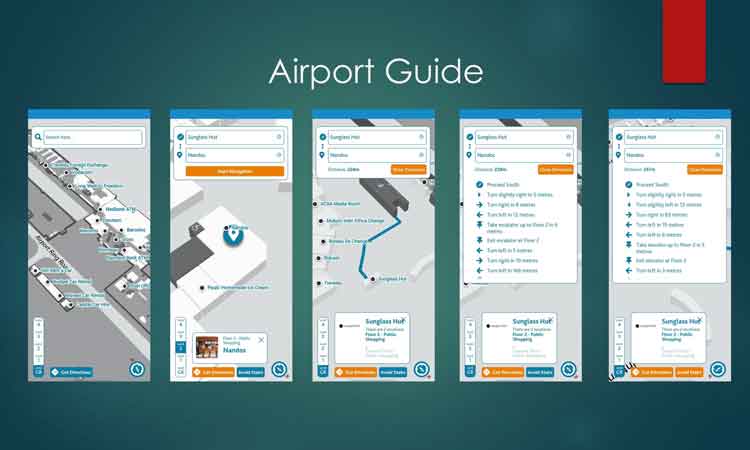Passenger journey reimagined: Innovative and AI technologies applied
7 November 2022
Shares
Mthoko Mncwabe, Chief Information Officer of Airports Company South Africa, gives his overview of innovative airport technology and how it can revolutionise the passenger experience.
Imagine a world where you arrive at the airport and the gates know your name without presenting your Identity Document and Boarding Pass. Everything is automated. You check in your bag using a high-tech solution which tracks it from the moment you’ve checked in, to when you arrive at your destination. You are not worried about finding your way, as there is a GPS-enabled system guiding you every step of the way. When you finally get to your flight, your seat welcomes you and immediately entertains you according to your preference. A passenger journey reimagined….
With the right technology, this imagined future may indeed be a reality. The emergence of technology trends in the travel industry presents a unique opportunity for us to creatively deliver an innovative experience to our travellers. What does that look like? How would the environment be impacted? Those are some of the considerations we have when exploring this amazing world of technology.
Artificial intelligence
According to WNS Ltd, a leading process management company, artificial intelligence in airlines is set to reach $2.2 billion by 2025. The most common use of this technology is with chatbots, which are increasingly used to engage customers and resolve queries. In Asia, this technology is currently being used to estimate the average lifespan of the parts of its planes to improve operational efficiencies. The use of this technology eliminates human error which can be detrimental in our industry where travellers rely on the most accurate information for the best travel experience.
Big Data
The concept of Big Data has been topical in many industries. This relates to the collection and subsequent use of mass data collected to study customer patterns and behaviour. Big data can help improve the customer journey or user experience and can provide airport management companies such as ACSA with analytics to make informed decisions. We could enhance retail services provided to passengers by understanding consumer patterns and behaviour. In the travel industry, we collect a lot of customer information. Question is, how do we create value and knowledge applying this information to support the aviation industry as a whole? Imagine if we knew exactly what traveller X preferred to watch on their flight by just observing trends and analysing data we have at our disposal?
Contactless technology
With the recent pandemic, travellers have become accustomed to the concept of no touching, and the growing use of contactless devices. No touching presents a safe environment for travellers and gives them a sense of comfort. Globally, airports are doing away with paper boarding passes and physical ID’s. This has been replaced with biometric systems with facial recognition and contactless boarding passes. In addition to the safety elements presented by this technology, it has streamlined processes and saves time and resources.


The ACSA app provides information on flights, parking, F&B and retail outlets, facilities and health and safety, as well as customer feedback and chat bot capabilities.
Metaverse
Garner predicts that 25 per cent of people will spend at least an hour a day in the metaverse by 2026. This is incredible, considering that this trend of a virtual environment is still a new and ever evolving concept. Like we have learnt with other technologies, the key is in embracing it and all the opportunities it presents. With travel being such an emotive experience, the metaverse could assist in painting a picture for the traveller and further enhancing their experience with the use of sense, sound, feeling and imagination. That’s what the metaverse presents us with: a parallel virtual reality. The retail sector that forms part of the airport experience can also benefit by curating customer experiences in the metaverse and engaging travellers.
Digital twin technology
Digital twins are 3D digital depictions of systems and facilities, which allow visual modelling and can be used for future design and ongoing monitoring and systems testing. Some of the airports testing this technology include Hong Kong International Airport (HKIA), which is using high-quality real-time travel data to make predictions and model new projects for smart operations. The digital twin technology is still an upcoming trend in the aviation industry, it is only a matter of time before we start seeing the impact of this incredible technology.
Mobile app
In order to enhance a passenger’s experience at airports, airport management companies have begun introducing mobile apps. International Airport Review notes that according to SITA, 68 per cent of passengers will be digital travellers by 2025, so now is the time for airports to step up their digital strategies and ensure they deliver the mobile-friendly passenger experience people expect. Airports Company South Africa (ACSA) has recently launched a mobile app aimed at enhancing the customer experience. The ACSA app which is available for download for free on Apple, Google and Huawei App stores has been designed upon the needs of our customers throughout their journey – from getting ready to take a flight to your destination. Passengers are able to receive all applicable information in real time, that is required when travelling, at the touch of a button.
In conclusion
Next generation technology will drive the economy of the future. Embracing technology is a matter of timing more than it is of choice. No industry will be spared of the effects of digital disruption. The aviation industry has the added pressure of travellers being exposed to various technologies as they explore the world. Their expectations are quite high when it comes to what they expect to experience at airports and our role is to make it a reality!


His role is at Airports Company South Africa entails adding value and driving efficiency in the business through direct management of application performance and ensuring the performance of business-critical applications.
Mthokozisi will continue to grow Airports Company South Africa’s core digital platforms and related support and reporting systems and strive for a cost-effective platform strategy in becoming the world’s best airports company. Security challenges at Airports Company South Africa will be adequately addressed to secure and mitigate potential data losses and reputational risks.
Mncwabe holds a BSc (Mathematics) and BSc (Computer Science Honours) from the University of KwaZulu-Natal and completed an MBA at Milpark Business School and an executive development programme through GIBS.













